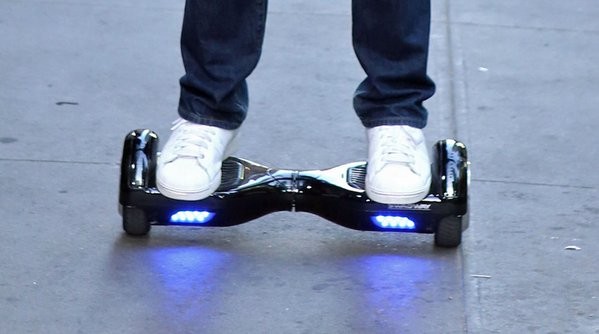By Steve Pak, | January 12, 2016

Hoverboard
Hoverboards' hot lithium batteries could be causing many units to explode and catch fire, but scientists have a new solution. California researchers have developed a new lithium-ion battery that automatically shuts down to avoid overheating, and then restarts after it has cooled down.
Stanford University's scientists claim they have invented the world's first lithium-ion battery that turns off when it reaches a minimum temperature, and then turns back on after the power source has cooled down, according to Gizmodo. Their study was published in the journal Nature Energy.
Like Us on Facebook
Zhenan Bao is a chemical engineering professor at Stanford. She explained In a press conference that the technology's sensor shuts down the battery before it is able to overheat, without sacrificing the performance of devices.
The new battery technology has many applications. They include improved navigation systems, computer batteries, and other electronics with a high risk of catching fire.
Scientists developed a "thermally responsive polymer." The thin yet powerful substance could form a casing around the battery, and would be filled with spiky nickel particles that take in electricity.
When the spiky particles are near each other electricity flows to power the battery. However, if temperatures get too high the polymer expands, which causes the particles to separate and the electricity flow to stop.
The lithium-ion battery then shuts down. However, after it cools down, the nickel particles get closer and electricity starts to flow again causing the device to run again.
Stanford's research team tested the new battery by connecting it to a LED light, and then shot it with a hot-air gun. The heat caused the LED light to switch off, and then turned on again after the heat source was removed.
Rechargeable lithium batteries have remained popular among companies and shoppers due to their high energy storage. However, they have also been blamed for many fires and explosions during recent years, involving products from famous companies such as Sony, Tesla, and Boeing.
The new lithium-ion battery is still being lab tested so it is unknown when it would be available in commercial products. However, it could certainly make electronic apparatuses such as hoverboards, computers, cars, and airplanes safer, according to The Christian Science Monitor.
-
Use of Coronavirus Pandemic Drones Raises Privacy Concerns: Drones Spread Fear, Local Officials Say

-
Coronavirus Hampers The Delivery Of Lockheed Martin F-35 Stealth Fighters For 2020

-
Instagram Speeds Up Plans to Add Account Memorialization Feature Due to COVID-19 Deaths

-
NASA: Perseverance Plans to Bring 'Mars Rock' to Earth in 2031

-
600 Dead And 3,000 In The Hospital as Iranians Believed Drinking High-Concentrations of Alcohol Can Cure The Coronavirus

-
600 Dead And 3,000 In The Hospital as Iranians Believed Drinking High-Concentrations of Alcohol Can Cure The Coronavirus

-
COVID-19: Doctors, Nurses Use Virtual Reality to Learn New Skills in Treating Coronavirus Patients









